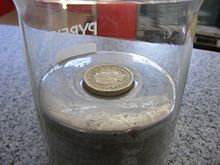උත්ප්ලාවකතාව
Appearance

| මෙම ලිපිය |
| සන්තති යාන්ත්ර විද්යාව |
|---|
| පිළිබඳ ලිපි මාලාවේ කොටසකි |
 |
උත්ප්ලාවකතාව, (ඉංග්රීසි: Buoyancy).
"වස්තුවක් අර්ධ වශයෙන් හෝ පූර්ණ වශයෙන් තරලයක (ඝන,ද්රව,වායු) ගිලී පවතින විට එම වස්තුව මගින් විස්ථාපනය කරනු ලබන තරලයේ බරට සමාන උඩුකුරු තෙරපුම් බලයක් තරලය මඟින් වස්තුව මත ඇති කරයි."
ආකිමිඩීස් නියමය
[සංස්කරණය]
ප්රධාන ලිපිය: ආකිමිඩීස් නියමය
මෙම කොටස හිස්ය. එය පුළුල් කිරීමෙන් ඔබ හට උපකාර කළ හැක. |
බල සහ සමතුලිතතාව
[සංස්කරණය]මෙම කොටස හිස්ය. එය පුළුල් කිරීමෙන් ඔබ හට උපකාර කළ හැක. |
සරල කළ ආකෘතිය
[සංස්කරණය]


මෙම කොටස හිස්ය. එය පුළුල් කිරීමෙන් ඔබ හට උපකාර කළ හැක. |
Static stability
[සංස්කරණය]ප්රධාන ලිපිය: Ship stability

මෙම කොටස හිස්ය. එය පුළුල් කිරීමෙන් ඔබ හට උපකාර කළ හැක. |
තරල සහ වස්තු
[සංස්කරණය]මෙම කොටස හිස්ය. එය පුළුල් කිරීමෙන් ඔබ හට උපකාර කළ හැක. |
Compressible objects
[සංස්කරණය]මෙම කොටස හිස්ය. එය පුළුල් කිරීමෙන් ඔබ හට උපකාර කළ හැක. |
සබ්මැරීන
[සංස්කරණය]මෙම කොටස හිස්ය. එය පුළුල් කිරීමෙන් ඔබ හට උපකාර කළ හැක. |
බැලූන
[සංස්කරණය]මෙම කොටස හිස්ය. එය පුළුල් කිරීමෙන් ඔබ හට උපකාර කළ හැක. |
කිමිදුම්කරුවෝ
[සංස්කරණය]මෙම කොටස හිස්ය. එය පුළුල් කිරීමෙන් ඔබ හට උපකාර කළ හැක. |
ඝනත්ත්වය
[සංස්කරණය]
මෙම කොටස හිස්ය. එය පුළුල් කිරීමෙන් ඔබ හට උපකාර කළ හැක. |
ආශ්රිත
[සංස්කරණය]- Atmosphere of Earth, also known as Air – gas layer surrounding Earth
- Archimedes paradox
- Buoy
- Brunt–Väisälä frequency
- Buoyancy compensator (diving)
- Buoyancy compensator (aviation)
- Cartesian diver
- Dasymeter
- Diving weighting system
- Fluid – substance which continuously deforms under an applied shear stress, including liquids and gases
- Hydrostatics – branch of fluid mechanics that studies fluids at rest
- Galileo thermometer
- Hull (ship)
- Hydrometer
- Hydrostatic weighing
- Lighter than air
- Naval architecture
- Plimsoll line
- Pontoon
- Quicksand
- Salt fingering
- Submarine – watercraft capable of independent operation underwater
- Swim bladder
- Thrust
මූලාශ්ර
[සංස්කරණය]භාහිර සබැඳි
[සංස්කරණය]උත්ප්ලාවකතාව , යන්න නිදහස් ශබ්දකෝෂය වන වික්ෂනරිය දී සොයා බලන්න.
උත්ප්ලාවකතාව හා සබැඳි මාධ්ය විකිමාධ්ය කොමන්ස් හි ඇත.
